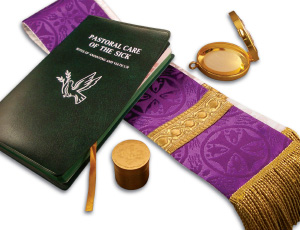Please call Parish Office 508-693-0342 for someone in need, or if you wish to receive this sacrament.
Jesus came to heal the whole person, body and soul. Through the sacrament of Anointing of the Sick, the Church continues what Jesus did during His earthly life, receiving from Him the power to heal and forgive.
Anointing of the Sick is a liturgical and communal celebration. In it we encounter God hidden within tangible elements and signs. The liturgical actions, laying on of hands (a biblical gesture of healing and an invocation for the coming of the Holy Spirit), the prayers of the community represented by the priest and those assembled, and the anointing with the blessed Oil of the Sick (signifying the Spirit’s healing and strengthening presence), are signs of special graces conferred upon the sick. The sacrament unites the sick person more intimately to the Passion of Christ for his good and for the good of all the Church. It gives comfort, peace, courage, and even forgiveness of sins. Sometimes, if it is the will of God, it brings about the restoration of physical health.
Suffering and illness have always been among the greatest problems that trouble the human spirit with despair, and pain—turning us inward (looking at ourselves) but it is our faith that helps us bear the pain with greater courage through this sacrament—which brings our focus back on God and his many gifts.. The Second Vatican Council tells us “by the sacred anointing of the sick and the prayers of its priests, the whole Church commends the sick to the suffering and glorified Lord so that he may raise them up and save them.”
Jesus often visited and healed the sick in his lifetime because he loved them even in their illness. In the Bible, we hear of Jesus healing: the Paralytic (Mark 2:1-12), the Centurion Servant (Matt. 8:5-13), even Bartimaeus (Mark 10:46-52). Was Jesus more concerned with healing the physical body or their souls? At the time of Jesus, if you had a physical illness or disease, the people believed it was because of something you did wrong, your sin. Jesus’ teaching contradicted this way of thinking. Jesus spoke about sin and illness when he healed the man born blind, found in the Gospel of John (John 9:1-7).
Jesus gives this authority to care for and heal the sick to his disciples when he commissioned them (Mark 6:7-13). Verse 13 reads: “They drove out many demons, and they anointed with oil many who were sick.” Note the reading in James 5:13-15, “Is anyone among you suffering? He should pray. Is anyone in good spirits? He should sing praise. Is anyone among you sick? He should summon the presbyters of the church, and they should pray over him and anoint [him] with oil in the name of the Lord, and the prayer of faith will save the sick person, and the Lord will raise him up. If he has committed any sins, he will be forgiven.” Because of apostolic succession, the apostles then passed it on to the bishops who then passed on God’s authority to the priests.
Jesus himself was anointed prior to his suffering and death (John 12:1-11). Christians who are ill and suffering know from Christ’s words that sickness has meaning and value for their own salvation and for the salvation of the world.
